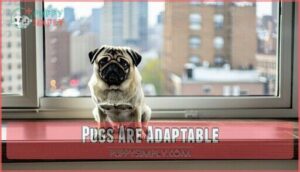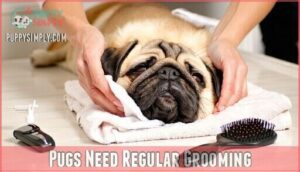This site is supported by our readers. We may earn a commission, at no cost to you, if you purchase through links.

These velcro dogs follow you everywhere, acting as emotional support animals with unwavering loyalty. They’re surprisingly intelligent, learning tricks quickly through positive reinforcement and food rewards.
Pugs exhibit moderate energy with playful bursts of "zoomies" but need frequent breaks due to their flat faces.
They’re adaptable to apartments and require only 30 minutes of daily exercise.
However, over 90% suffer from breathing problems, and half develop skin issues without proper wrinkle care. Their low-maintenance grooming needs just weekly brushing, making them relatively easy pets despite health challenges that demand attention.
Table Of Contents
- Key Takeaways
- Pugs Are Affectionate
- Pugs Are Playful
- Pugs Are Smart
- Pugs Are Low-Maintenance
- Pugs Are Adaptable
- Pugs Get Along Well With Other Animals
- Pugs Need Regular Grooming
- Pugs Need Regular Exercise
- Pugs Need a High-Quality Diet
- Pugs Can Be Prone to Health Problems
- Frequently Asked Questions (FAQs)
- What is the downside of owning a Pug?
- Are Pugs a good house dog?
- Are Pugs high maintenance?
- What is the sad truth about Pugs?
- Are pugs good with small children?
- How often should I brush my pug’s coat?
- Do pugs have any specific exercise requirements?
- What kind of diet should I feed my pug?
- What are some common health problems that pugs may experience?
- Do pugs bark excessively or frequently?
- Conclusion
Key Takeaways
- You’ll get an incredibly affectionate companion who follows you everywhere and craves constant human connection, making them perfect emotional support animals but poor choices if you’re away from home frequently.
- You’ll need to manage serious health challenges since over 90% of pugs suffer from breathing problems and half develop skin issues, requiring daily wrinkle cleaning and regular vet visits.
- You’ll enjoy a surprisingly intelligent and adaptable dog who learns tricks quickly, thrives in apartments, and gets along well with other pets and children.
- You’ll have a low-maintenance companion who needs only 30 minutes of daily exercise and weekly brushing, though they shed heavily year-round.
Pugs Are Affectionate
If you’re wondering whether pugs make affectionate family pets, the answer’s absolutely yes.
These cuddle bugs are known for their loving nature and unwavering pug loyalty to their families.
Their pug temperament centers around being emotional support companions who thrive on human connection. You’ll find their pug personality incredibly devoted – they’re loyal companions who want nothing more than pug companionship with you.
Pugs live for your attention and turn into devoted shadows who follow you everywhere
However, their affectionate nature means they don’t handle being alone well.
Pugs can also make great service dog candidates due to their gentle and adaptable nature.
Pugs Are Playful
Your pug’s playful nature shines through daily interactions and fun activities.
These dogs display moderate energy levels with bursts of enthusiasm, especially during short play sessions.
You’ll notice their pug personality includes spinning, "zoomies," and playful bowing that showcases classic pug behavior.
Interactive toys satisfy their curiosity while preventing boredom.
Their pug temperament thrives on games like fetch and tug-of-war, though their flat faces limit extended roughhousing.
Proper playtime tips include frequent breaks to prevent overexertion and panting.
Understanding pug and cat socialization issues is vital for harmonious multi-pet households, considering their classic pug behavior and need for frequent breaks to ensure a happy and healthy pug temperament.
Pugs Are Smart
Beyond their playful nature, pug intelligence often surprises new owners. These dogs consistently rank well in trainability tests and demonstrate impressive cognitive ability when motivated properly.
Smart pugs surprise owners with their quick learning and problem-solving skills when properly motivated.
Their learning speed accelerates with positive reinforcement, especially food-based rewards. Pug temperament includes natural problem-solving skills that emerge during training sessions.
Here are five intelligence tests you can try at home:
- Hide treats under cups and watch them figure out the game
- Teach them to ring a bell for potty breaks
- Practice "find the toy" commands in different rooms
- Use puzzle feeders to challenge their minds
- Rotate training commands to test memory retention
Smart pug behavior shows up in their ability to read your emotions and adapt accordingly. Their pug characteristics include stubborn streaks, but patience pays off. These pug traits make them excellent candidates for basic obedience and even advanced tricks when you’re consistent with training methods. Pugs can excel in service dog roles with proper training and socialization.
Pugs Are Low-Maintenance
Your pug’s easygoing nature makes ownership surprisingly manageable for busy lifestyles. These adaptable dogs thrive with minimal fuss, requiring only basic daily routine maintenance without complex care schedules.
Pugs are often considered part of the low maintenance breeds that are well-suited for various living situations.
| Care Aspect | Time Required | Difficulty Level |
|---|---|---|
| Daily Routine | 30-45 minutes | Easy |
| Exercise Needs | 30 minutes | Low Exercise |
| Living Space | Minimal Space | Simple |
| Grooming | Weekly brushing | Easy Care |
Pugs excel in Simple Living environments, from apartments to houses. Their low-maintenance pug temperament means you won’t spend hours on complicated care regimens. Unlike high-energy breeds, these dogs are content lounging indoors between short walks.
Pug ownership becomes even more appealing when you realize their flexible schedules adapt to your lifestyle. Whether you’re home all day or work standard hours, pug care remains straightforward and stress-free for most owners.
Pugs Are Adaptable
One of the biggest perks of pug ownership is their remarkable ability to roll with whatever life throws at them.
Whether you’re cramming into a tiny studio apartment or sprawling across suburban acreage, these adaptable little characters make themselves right at home.
Your pug’s flexible nature shines through in various living situations:
- Apartment Life: Pugs thrive in compact spaces without the restless energy of larger breeds
- Family Dynamics: They seamlessly adjust to households with kids, seniors, or busy professionals
- Environmental Adjustments: From quiet neighborhoods to bustling city streets, pugs adapt their behavior accordingly
This pug adaptability stems from their easygoing temperament and social intelligence.
They’re not demanding space hogs or high-maintenance drama queens.
Instead, your pug will happily mirror your lifestyle—active when you’re energetic, content to lounge when you’re relaxing.
Their social adaptation skills make pug ownership surprisingly stress-free, regardless of your living arrangement.
Understanding basic obedience training is also essential for a harmonious household.
Pugs Get Along Well With Other Animals
Social harmony thrives when you add a pug to your multi-pet household.
These gentle companions excel at animal socialization, creating lasting bonds with cats, dogs, and smaller pets alike.
Their low prey drive and non-aggressive nature make pug friendship a natural fit for family pets.
Understanding pug cat compatibility is key to a harmonious household with multiple pets.
- Pet harmony: Pugs adapt quickly to existing animal dynamics without territorial disputes
- Dog interactions: They initiate playful exchanges while respecting other pets’ boundaries
- Multi pet success: Over 85% of households report positive pug adaptability outcomes
- Animal friendship: Their easygoing pug temperament fosters genuine connections across species
Pugs Need Regular Grooming
While pugs get along wonderfully with other pets, keeping them healthy requires consistent grooming attention. Your pug’s double coat creates significant shedding issues that demand regular brushing and frequent vacuuming.
Daily skin care becomes critical since facial wrinkles trap dirt and moisture, leading to painful infections without proper cleaning. Use gentle wipes to clean these folds thoroughly each morning.
Coat maintenance involves weekly brushing sessions to manage loose fur, though you’ll still find hair everywhere. Don’t forget nail trimming every few weeks and regular ear cleaning. These grooming tips aren’t just about appearance—they’re essential for your pug’s health and comfort.
Regular grooming sessions also involve understanding dog grooming techniques to guarantee your pug receives the best care.
Pugs Need Regular Exercise
Despite their reputation as "couch potatoes," pugs require consistent physical activity to maintain healthy health.
You’ll need to provide at least 20-30 minutes of moderate exercise daily through structured daily walks and play sessions.
Their activity levels should match their physical limits—short bursts work best due to their brachycephalic anatomy.
Morning and evening walks prevent overheating while meeting their exercise needs.
Indoor play sessions with interactive toys supplement outdoor activities during extreme weather.
This low-maintenance approach to pug exercise supports healthy weight management and reduces behavioral issues.
Regular physical engagement improves pug temperament by decreasing anxiety and excessive barking.
Remember, appropriate pug playfulness involves scent games and gentle fetch rather than high-intensity activities that strain their respiratory system.
Understanding growth plate closure is vital for designing a safe and effective exercise plan for your pug.
Pugs Need a High-Quality Diet
Quality nutrition forms the foundation of your pug’s health and helps prevent obesity-related complications.
These adorable dogs have hearty appetites but need careful diet management to maintain their low-maintenance pug temperament.
- Choose balanced meals: Select premium dog food formulated for the pug breed’s specific needs, considering potential food allergies and providing proper nutrition tips.
- Monitor healthy snacks: Limit treats to 10% of daily calories and establish consistent diet plans that support essential pug health without compromising their wellbeing.
Understanding the best dog food options is vital for maintaining a healthy pug.
Pugs Can Be Prone to Health Problems
You’ll want to know that pugs face some serious health challenges before bringing one home. These adorable flat-faced dogs suffer from breathing problems due to their brachycephalic airway syndrome – over 90% have some form of airway obstruction.
Their shortened snouts make breathing difficult, especially in hot weather when they’re prone to overheating. Eye problems are another concern since their protruding eyes make them three times more likely to need veterinary care.
Corneal ulcers affect 10% of pugs during their lifetime. Skin infections develop in those cute facial wrinkles if you don’t clean them regularly – about 50% of pugs deal with skin fold dermatitis.
Weight management becomes essential since over 60% of pugs are overweight, leading to joint stress and breathing difficulties. Considering these potential health issues, exploring options for pug pet insurance is a worthwhile consideration.
While these health issues sound scary, proper care and regular vet visits help most pugs live happy, comfortable lives.
Frequently Asked Questions (FAQs)
What is the downside of owning a Pug?
Like Pandora’s box, Pug ownership releases constant challenges: year-round heavy shedding, daily wrinkle cleaning, breathing problems, heat intolerance, stubborn training, separation anxiety, and expensive vet bills for health issues.
Are Pugs a good house dog?
Pugs make excellent house dogs. They’re adaptable, low-energy companions perfect for apartments or homes. You’ll love their affectionate, laid-back nature, though they require daily wrinkle cleaning and shed considerably.
Are Pugs high maintenance?
Think of maintaining a vintage car that’s absolutely charming but needs constant attention.
You’ll clean their wrinkles daily, manage heavy shedding, monitor breathing issues, and provide regular vet visits, making pugs moderately high maintenance.
What is the sad truth about Pugs?
You’ll face heartbreaking health issues – breathing problems, eye injuries, and skin infections plague these lovable companions. Their shortened faces cause constant respiratory distress, making every summer dangerous.
Are pugs good with small children?
Your little one’s about to meet their new "shadow" – pugs are gentle, patient companions who’ll follow kids everywhere.
They’re naturally non-aggressive and adapt well to children’s energy levels, making them excellent family dogs.
How often should I brush my pug’s coat?
Daily brushing helps manage your pug’s notorious shedding, though it won’t eliminate it completely. Their double coat sheds year-round, so consistent grooming keeps loose fur manageable and your furniture cleaner.
Do pugs have any specific exercise requirements?
Pugs need moderate exercise – about 30-45 minutes daily through short walks and indoor play.
Their flat faces make them prone to overheating, so avoid strenuous activities and hot weather workouts.
What kind of diet should I feed my pug?
Believe it or not, you’ll need high-quality dog food with balanced protein and controlled portions. Avoid overfeeding since pugs gain weight easily, which worsens breathing problems and joint issues.
What are some common health problems that pugs may experience?
Your pug faces breathing difficulties from their flat face, plus eye injuries, skin fold infections, weight gain, and joint problems. Regular vet checkups help manage these brachycephalic breed challenges effectively.
Do pugs bark excessively or frequently?
Barking frequency varies among individual dogs.
Your pug might bark when excited, bored, or alerting you to visitors.
They’re not typically excessive barkers compared to other breeds, but consistent training helps manage any problematic vocal habits.
Conclusion
Owning a pug is like having a four-legged shadow who doubles as your personal comedian.
Understanding pug temperament and what’s it like owning one reveals you’ll gain a devoted companion who thrives on human connection.
You’ll need to manage their breathing issues and provide consistent grooming, but their adaptable, loving nature makes every challenge worthwhile.
These intelligent, playful dogs transform houses into homes through their unwavering loyalty and infectious personality.















